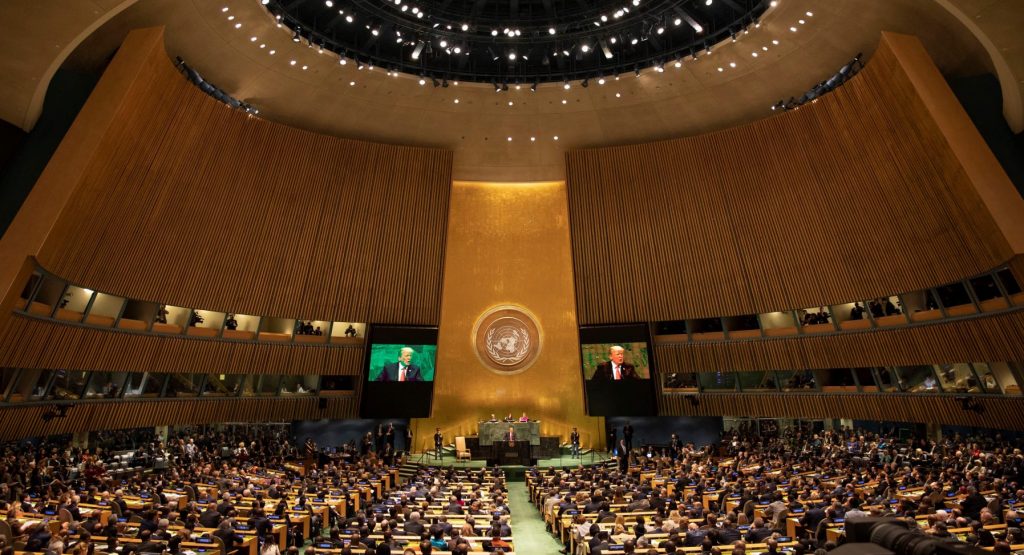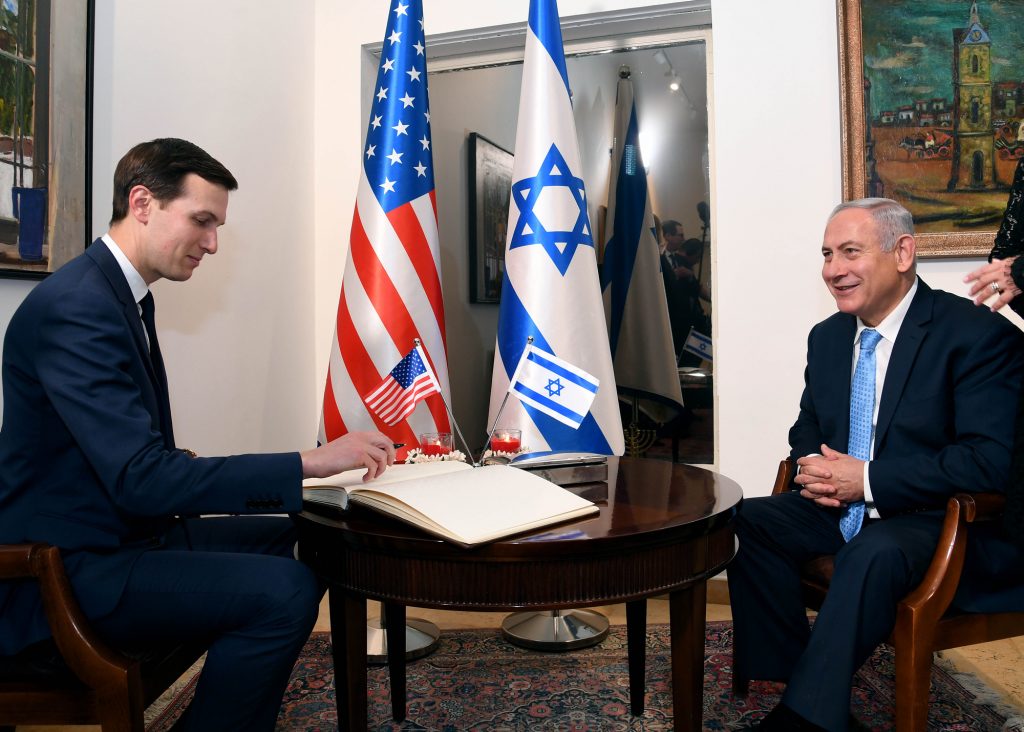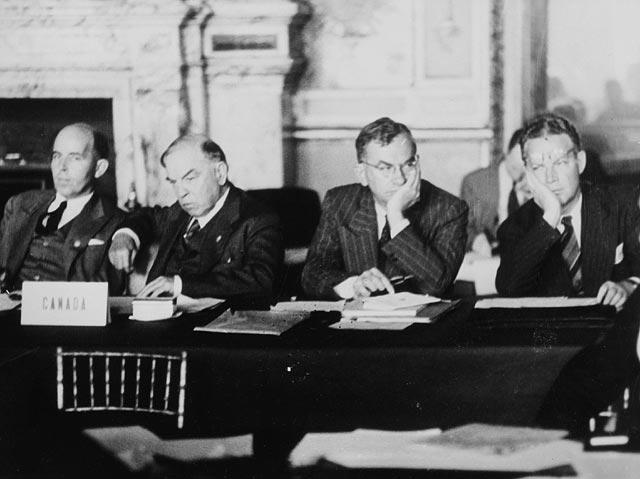
Donald Trump addresses world leaders and diplomats at the U.N. General Assembly in New York City, September 25, 2018
By Berkay Gülen
Following Avigdor Lieberman’s resignation from the position of minister of foreign affairs in May 2015, Israel’s prime minister (PM) Benjamin Netanyahu added one more minister title to his portfolio. Netanyahu served as Israel’s minister of foreign affairs — as well as being the prime minister, minister of defense, minister of health, and minister of labor — through February 2019, when the Israeli High Court forced him to turn over the role to Israel Katz, who is already Israel’s minister of intelligence and transportation.
Historically, the Israeli Ministry of Foreign Affairs (MFA) is an organization that shares foreign policy decision-making with security and intelligence agencies, namely the Israel Defense Forces, Mossad, and Shin Bet. Until the last minister, Avigdor Lieberman, left the office in May 2015, powerful political figures such as Golda Meir, Moshe Dayan, and Shimon Peres served as the minister of foreign affairs. What has changed to sideline the Israeli MFA and make the prime minister’s office the main decision-maker in Israeli foreign policy?

Israeli Prime Minister Benjamin Netanyahu and Jared Kushner, Donald Trump’s son-in-law, at a 2018 dedication of the new U.S. embassy in Jerusalem
Israel is not a unique case when it comes to the limited influence of ministries of foreign affairs. The personal ties between political decision-makers — usually advisors, lawyers, and even sometimes sons-in-law — have been challenging the influence of bureaucracy in foreign policy. Jared Kushner, senior advisor to his father-in-law U.S. President Donald Trump, worked as a peace broker between the Palestinian Authority and Israel in 2018 and played a substantial role in moving the U.S. embassy from Tel Aviv to Jerusalem. Berat Albayrak, the Turkish president’s son-in-law and the minister of finance in Turkey, has been playing a significant role in Turkey’s economic and foreign policy in the last couple of years.
The “golden age” of diplomacy
Another factor is the changing role of ministries of foreign affairs themselves. After World War I, diplomacy, professional diplomats and ministries of foreign affairs entered into a golden age. Following the war, victories often took place at the negotiating tables rather than on the battlefield. Diplomats were the main source of conveying information about their respective countries in international politics and transmitting local developments back to their home countries.

Canadian delegation at the 1946 Paris Peace Conference in the Palais du Luxembourg
Following World War II, college education in social science expanded in Europe and North America in order to create multilingual state officers, specifically foreign service personnel. During the Cold War years, the federal government also supported more faculty positions in the United States with the intention of teaching non-Western languages, cultures, and politics to the new cadre of diplomats.
During my research in Turkey and Israel last year, I interviewed foreign policy makers, a majority of whom were retired diplomats. The way they understood their role in foreign policy making during the Cold War years was as having been fundamental and game-changing. They were the ones who spread their governments’ messages all around the world and who worked to change perspectives about their home countries in global capitals. Although the role of diplomats in Turkey and Israel has changed in different ways following the Cold War, diplomats in both countries agree that the importance of their work is not the same as it was thirty years ago.
Why diplomacy matters less today
The main reason for the declining role of diplomats is that governments no longer solely rely on special representatives to convince the world of their positions. In other words, diplomacy is not the only way of conveying an official message any more. In an age where diplomats hear the official position of their governments on Twitter, no political figure has time and opportunity to wait for bureaucracy to work. The fast-changing world politics of today has also paved the way for heads of governments to make their own decisions without consulting with technocrats first.
Another aspect of the changing environment in foreign policy decision-making, which I work on in my research, is the overall perception of diplomats. Similar to other countries, the perception of the Israeli Ministry of Foreign Affairs in decision-making is not very positive. Israeli diplomats are not immune from the criticism that they tend to refrain from taking risks in critical negotiations, fail to find fast-track solutions to multilateral problems, and are too soft in their manners to convince their counterparts.
Not only the cabinet but also the members of the security establishment in Israel describe Israeli diplomats as being old-fashioned and slow to offer options in times of crisis. In Israel, and in many other countries around the world, the representation of diplomats nowadays is as not being efficient, bold or influential. Does this mean that states no longer need diplomacy?
The role of diplomacy in the modern era
States are questioning the effectiveness of diplomatic personnel and the cost of their activities at a time when diplomacy no longer requires foreign policy actors to participate in physical meetings. For instance, in the last two years Israel cut the budget of its Ministry of Foreign Affairs five times and moved some of its operations to the security agencies and the Ministry of Strategic Affairs on the basis of effective policy making.
Yet the diplomatic tradition is still vital for states in terms of negotiating the conditions of long-term conflicts and gaining long-term benefits, especially when regional powers such as Israel need to send clear messages in order to compete in the rising new global power structure.
Alongside Israel, many states still work hard to tell their own version of the story to individuals, states, institutions, and companies through different channels, and diplomacy, whether or not official or public, still offers a clear message about government policies. Nowadays, there are fewer people who pay attention to official discourse, but many people also expect to hear official positions in times of crisis. The reason for this expectation is that diplomacy as a profession offers a long-term perspective rather than short-term ideological benefits.
However, classical diplomacy still needs to cope with the new era of multi-actor-based international relations, when international organizations and individuals also aim to influence global politics. The new tasks that diplomats and ministries must take on are harder to win than the battles at the negotiating table. Now, diplomats need to justify why their profession is still worth taking seriously when victories are also achieved in the digital world.







Leave A Comment